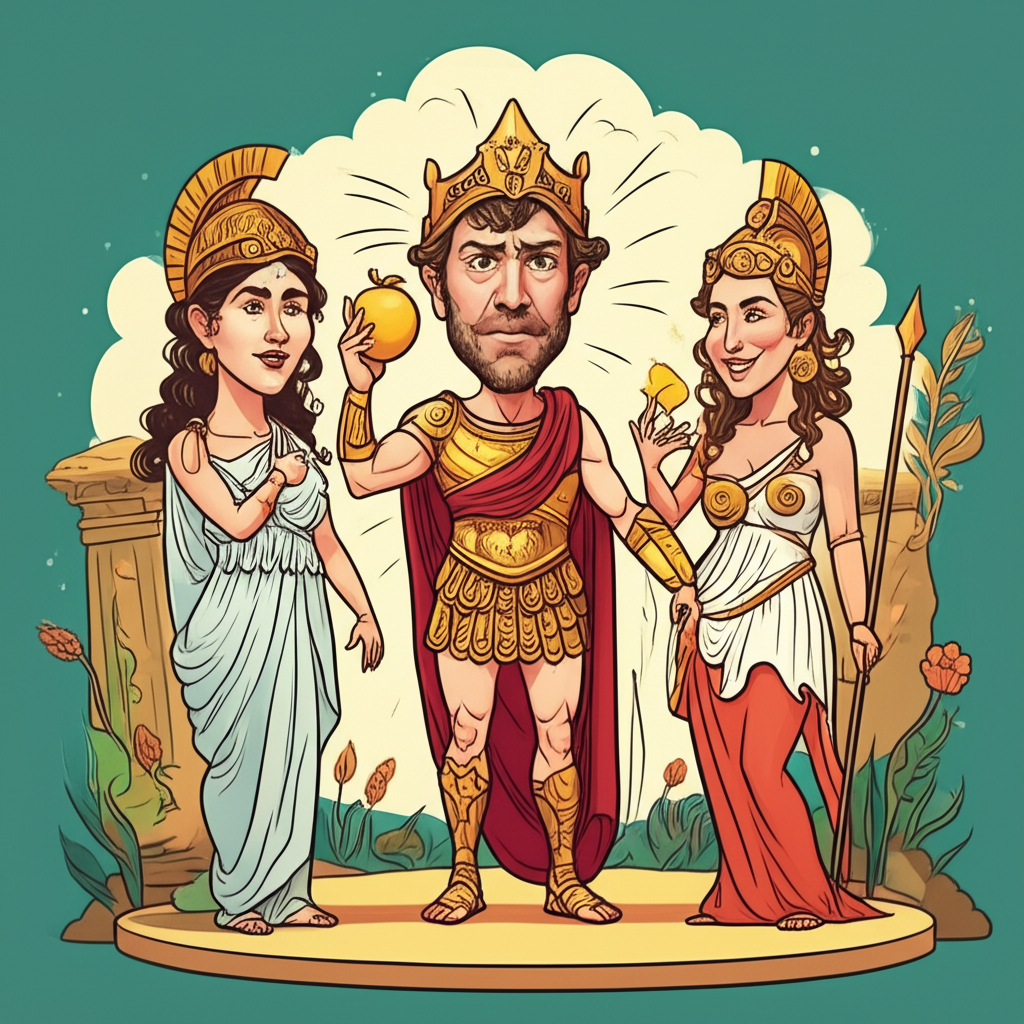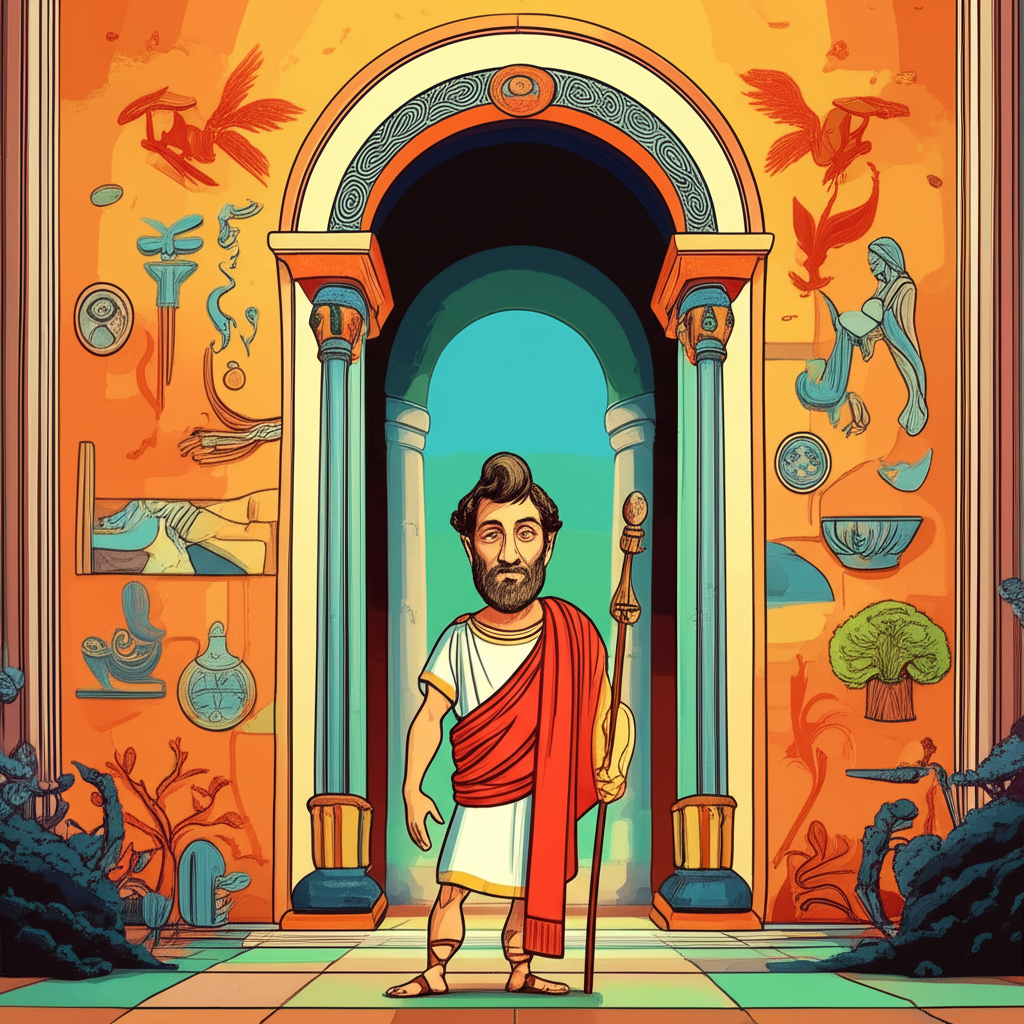
Among the rich tapestry of ancient Greek mythology, there exists a story so pivotal, so fraught with human folly and divine intervention, that its ripples were said to have caused one of the greatest wars of antiquity. This is the tale of the Judgment of Paris, a narrative originating from the vibrant oral traditions and written epics of ancient Greece. It is a traditional story, told and retold by ancient people, serving not as a record of historical fact or religious dogma, but as a compelling exploration of fate, choice, and the volatile nature of both mortals and the beings they imagined inhabiting Olympus.
Origins and Cultural Background
The cultural era in which the myth of the Judgment of Paris flourished was that of classical Greece, a period characterized by independent city-states, burgeoning philosophical thought, and a deep reverence for storytelling. For the ancient Greeks, myths were more than mere entertainment; they were fundamental to their understanding of the world. In an age without modern science, these narratives offered explanations for natural phenomena, moral guidance, and historical context for their lineage and identity. Their society was polytheistic, meaning they believed in a pantheon of gods and goddesses, each embodying specific aspects of the cosmos and human experience—from the thunderous power of Zeus to the strategic wisdom of Athena, and the seductive allure of Aphrodite.
People of that time viewed the world as a complex interplay between human will and divine intervention. Their gods were not distant, perfect beings, but rather anthropomorphic figures—powerful, immortal, yet prone to very human emotions like jealousy, wrath, love, and pride. They believed these deities actively participated in mortal affairs, often with unpredictable and dramatic consequences. Concepts like hubris (excessive pride leading to a downfall), moira (fate), and xenia (sacred hospitality) were deeply ingrained in their societal values, and these myths often served as cautionary tales or celebrations of these principles, reflecting the anxieties and aspirations of a civilization that sought meaning in a world often beyond their control.
Key Figures in the Narrative
The cast of characters in the Judgment of Paris is central to its dramatic weight, each representing powerful forces within the Greek mythological worldview.
- Eris, the Goddess of Discord: Not a primary Olympian, but a shadowy figure whose very essence was chaos and strife. In the myth, she embodies the disruptive force that sets the entire chain of events in motion. Her symbolic attribute is the golden apple, a seemingly innocuous object that becomes a catalyst for contention.
- Hera, Queen of the Gods: As the wife of Zeus, she represented marriage, women, and childbirth. She was often depicted as majestic and powerful, but also fiercely jealous and vengeful, especially when her authority or dignity was challenged. Her symbolic attribute is the peacock, and she represents sovereign power and domestic authority.
- Athena, Goddess of Wisdom and Strategic Warfare: Born from the head of Zeus, Athena embodied intelligence, reasoned battle, and crafts. She was a patron of heroes and cities, known for her calm demeanor and strategic prowess. Her symbols include the owl and the olive tree, representing wisdom and peace, but also the spear and shield, signifying her martial aspect.
- Aphrodite, Goddess of Love, Beauty, and Desire: Said to have emerged from the sea foam, Aphrodite was the embodiment of allure and passion. She held sway over hearts and was often depicted with doves and roses. Her symbolic attribute is beauty itself, and she represents the intoxicating, sometimes dangerous, power of desire.
- Paris, Prince of Troy: A mortal man, born to King Priam and Queen Hecuba of Troy. Prophecies at his birth foretold he would cause the destruction of his city, leading his parents to expose him on Mount Ida. He was raised as a shepherd, unaware of his royal heritage, making him an innocent, yet ultimately pivotal, figure in the divine machinations. He symbolizes the mortal caught between divine will and personal temptation.
It is important to remember that these descriptions are based on the symbolic roles and attributes ascribed to them within the ancient Greek mythological framework, not as beings to be worshipped or validated as real.
The Main Story: A Fateful Choice
The story unfolds with an event meant to be joyous: the wedding of Peleus, a mortal king, and the sea nymph Thetis. All the gods and goddesses of Olympus were invited, all, that is, except for Eris, the personification of Discord. Seething with resentment at this slight, Eris decided to exact her revenge. As the celebrations reached their peak, she stealthily entered the feast and cast a single, gleaming golden apple onto the banquet table. Upon its polished surface were inscribed two fateful words: "To the Fairest."
Immediately, a heated dispute erupted among three of the most powerful goddesses present: Hera, Athena, and Aphrodite. Each believed herself to be the rightful recipient of the apple, and their squabbling threatened to tear apart the Olympian harmony. The other gods, wisely, refrained from interjecting, knowing the wrath of these formidable figures. The goddesses eventually appealed to Zeus, the king of the gods, to settle their argument. However, Zeus, recognizing the impossibility of making such a judgment without incurring the eternal enmity of two of the goddesses, cleverly deflected the task. He declared that a mortal, unbiased by Olympian politics, should make the choice.
The chosen mortal was Paris, a young man of remarkable beauty who, unbeknownst to him, was a prince of Troy, living as a shepherd on Mount Ida due to a prophecy of doom surrounding his birth. Hermes, the messenger god, was dispatched to lead the three resplendent goddesses to Paris. Imagine the scene: the quiet solitude of the mountainside suddenly broken by the arrival of the divine, each goddess radiating an aura of immense power and beauty, accompanied by the swift-footed Hermes.
Hermes presented the golden apple to Paris and explained his unenviable task: he must choose the fairest among them. As the goddesses stood before him, each offered a bribe, not just an empty promise, but a vision of immense power and desire.
First stepped forward Hera, majestic and regal. She promised Paris dominion over all of Asia, the power of a king, immense wealth, and unparalleled authority, telling him he would be the most powerful man on Earth.
Next came Athena, intelligent and composed, her eyes gleaming with strategic wisdom. She offered Paris victory in all battles, unmatched martial skill, and profound wisdom, ensuring he would be renowned as the greatest warrior and strategist.
Finally, Aphrodite approached, her presence radiating an irresistible charm. She did not offer power or glory in battle, but something far more personal and intoxicating: the love of the most beautiful woman in the world, Helen of Sparta, whose beauty was legendary across all lands.
Paris, a shepherd prince, a mortal man swayed by desires, weighed the offers. The allure of power and wisdom were strong, but the promise of ultimate beauty and love proved irresistible. He handed the golden apple to Aphrodite, declaring her the fairest.
With this single act, Paris sealed his own fate and, unknowingly, the fate of his city. Hera and Athena, enraged and humiliated by his decision, vowed eternal vengeance against Paris and all of Troy. Aphrodite, true to her word, assisted Paris in eloping with Helen, who was already married to King Menelaus of Sparta. This abduction, fueled by the divine promise, ignited the flames of the Trojan War, a conflict that would rage for ten long years and ultimately lead to the prophesied destruction of Troy.
Symbolism and Meaning
To the ancient Greeks, the Judgment of Paris was a story laden with profound symbolism and meaning. It illustrated the perilous nature of choice, especially when faced with overwhelming temptation, and how a seemingly personal decision could have catastrophic, far-reaching consequences. Paris’s choice represented the human tendency to prioritize personal desire (love and beauty) over practical power (Hera’s offer) or strategic wisdom (Athena’s offer). It underscored the belief that even the most seemingly insignificant mortal could be a pawn in the grander schemes of the divine, and that divine intervention could easily trigger human conflict.
The myth also served as an etiological tale, explaining the origins of the Trojan War, a central event in Greek cultural memory. It highlighted the power of beauty and desire as forces capable of igniting wars and toppling kingdoms. Furthermore, it demonstrated the complex moral landscape of the gods themselves, who were not purely benevolent but driven by pride, jealousy, and self-interest, reflecting the unpredictable nature of the world the Greeks inhabited. It was a story about the intersection of fate and free will, where Paris’s choice, while seemingly free, was also part of a larger, prophetic narrative.
Modern Perspective
Today, the Judgment of Paris continues to resonate within Western culture, albeit interpreted through a modern lens. It is no longer seen as a literal divine judgment but as a powerful narrative archetype. The myth has inspired countless works of art, from Renaissance paintings by Rubens and Cranach the Elder, which visually explore the beauty of the goddesses, to operatic adaptations and literary retellings. Its most direct continuation is Homer’s Iliad, which details the Trojan War itself, a consequence of Paris’s decision.
In contemporary literature, movies (such as Troy), and even video games, elements of the myth are often reinterpreted to explore themes of choice, consequence, beauty, and conflict. Academically, it is studied for its contributions to understanding ancient Greek culture, religion, and the development of epic poetry. The phrase "apple of discord" has become an idiom in many languages, referring to the core of an argument or a small matter that leads to a larger dispute, a testament to the myth’s enduring linguistic and cultural impact.
Conclusion
The Judgment of Paris stands as a testament to the enduring power of storytelling within human culture. It is a traditional narrative from ancient Greece, woven from the imaginations of a people who sought to understand their world through heroic tales and divine dramas. It is a story to be appreciated for its cultural, historical, and educational value, offering insights into the worldview of an ancient civilization. As Muslims, we recognize that only Allah is the true Creator and Sustainer, and our belief rests solely in Him. Nevertheless, we can acknowledge the rich tapestry of human imagination across diverse cultures, respecting these stories as part of our shared global heritage—narratives that explore universal human themes of choice, consequence, and the search for meaning, even if they originate from different spiritual paths.




